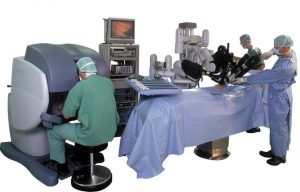“Doctor Robot will see you now.”
AI systems that are able to diagnose patients. Robotic prosthetics that work just as well, and in some cases better, than their biological originals. Specialist surgeons that are able to operate remotely through virtual reality. Healthcare will be revolutionised in the coming years thanks to advanced robotics and AI.
One of the benefits of introducing AI deep learning systems to healthcare is that there is already a massive amount of data available. Medical histories, blood types, allergy information… the list goes on and, as mentioned in my first post, the more information an AI system has at its disposal the smarter and more accurate it becomes.
Here are 3 ways AI and robotics are transforming healthcare.
Robotics
Healthcare professionals are understandably under a lot of pressure at work. One mistake can mean the difference between life and death. Thankfully, the introduction of robotics will help to alleviate some of these pressures.
The DaVinci machine, for example, gives surgeons the ability to operate on patients in small and intricate ways that simply wouldn’t be possible by a human hand. The instruments are ‘wristed’ which allows them to move inside patients with great precision and high-definition 3D cameras allow the surgeon greater visibility to minimise the risk of missteps.

Robots can also help to free-up nurse’s valuable time by taking care of repetitive tasks such as checking a patient’s vital signs, dealing with their hygiene and even taking blood samples. This will help nurses to spend more time on tasks that rely on human decision making and empathy which should in turn improve both the nurse’s and patient’s healthcare experience.
‘Social’ robots are also being introduced to those coping with depression and dementia. Paro is not only the cutest and most cuddly robot you’ve ever seen but is also proven to help relieve stress for both suffers and their carers. With over 80,000 people suffering from dementia in the UK, Gail Mountain, the professor of healthcare services at the University of Sheffield, believes that Paro can help bring comfort. “Anything that makes people feel comforted and more at ease with the world is worth it when people are in the later stages of dementia.” The cyborg seal is covered in sensors that allow it to react realistically to being stroked, played with and even spoken to. Check it out in action:
[youtube https://www.youtube.com/watch?v=TyEY8BUuPsc&w=650&h=450]
Human Augmentation
Will humans evolve into a society of cyborgs? The chances are highly likely. Moral and ethical concerns aside, the benefits of a brain that can remember more or an arm that can lift more than humanly possible are obvious.
According to technology author and philosopher Patrick Lin, “We now know enough about biology, neuroscience, computing, robotics, and materials to hack the human body.” ‘Hacks’ that have already been implemented include Rob Spence’s Eyeborg project which involved him replacing his damaged eye with a camera and Oscar Pistorius’ Össur blades which allowed him to compete in non-disabled sprint events at the 2012 Olympic games.

The possible applications of body augmentation in the healthcare sector are virtually limitless. Imagine a computer chip, inserted onto an alzheimer patients brain, that could warn doctors of potential violent episodes or artificial retinas that communicate directly with the brain to restore a blind patient’s sight. If this is all possible today, just picture what could be possible in the future as these technologies improve further.
Artificial Intelligence
As this blog has made clear, artificial intelligence will eventually transform every industry. But healthcare will be the first industry that will really benefit from its application.
When you feel ill or develop a symptom, like most of us, your first port of call is probably to type the problem into Google. This will usually lead to you discovering that you have brain cancer and only a week left to live! That’s part of problem on relying on the internet – there is just too much data to sift through to make a reasoned assessment of your symptoms.
This is where AI can help. Babylon Health have recently developed a smartphone app that uses artificial intelligence to offer informed advice about your ailments by appraising your medical history and circumstances, all in a friendly, IM-style chat format. Users can even speak face to face with GPs via video call for a small fee and have their prescriptions delivered to their door.
[youtube https://www.youtube.com/watch?v=lokJmOqOSA0&w=650&h=450]
AI is also helping to spot patterns in massive data sets of genetic information to predict how a cell will react to alterations in DNA. Deep Genomics is hoping that their machine learning technology could potentially save lives in the future by reading a patient’s genome, their biological markers, and prescribing a treatment that is unique to them. This kind of predictability of the effects of treatment would be impossible without the aid of AI. “We need machine learning because there’s no other way to do it,” says Brendan Frey, CEO of Deep Genomics. “Humans have never done this before, and they never will.”
To sum up, Healthcare is likely to be the first industry to take full advantage of robotics and artificial intelligence – and the results will be extraordinary. Robots will take care of patients, artificial intelligence could help to cure incurable diseases and humans will benefit greatly. In this industry in particular, the future is looking bright.
I must say you have high quality content here. Your website can go viral.